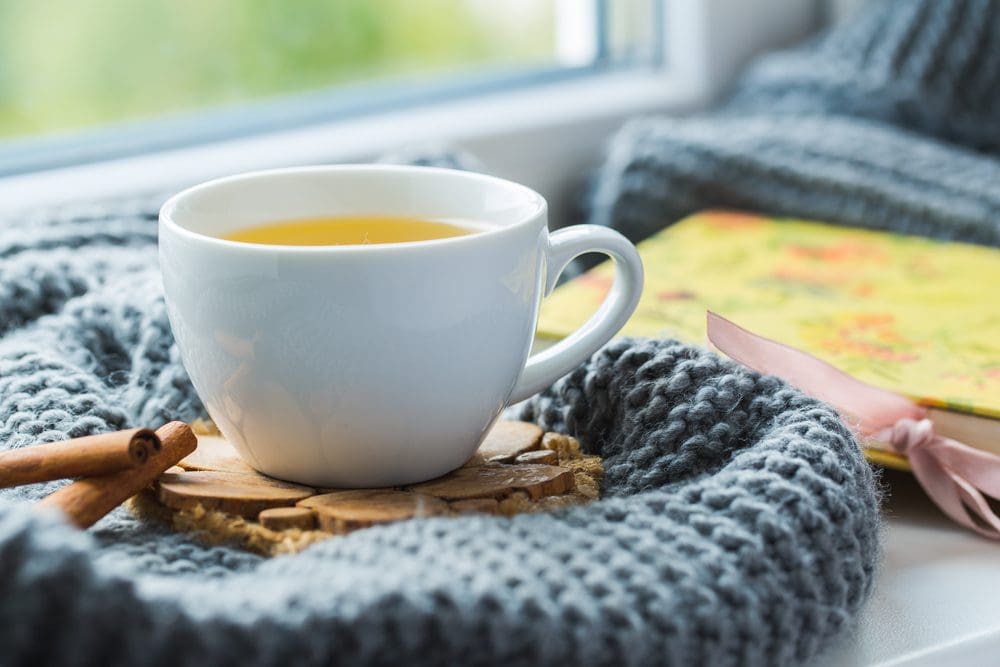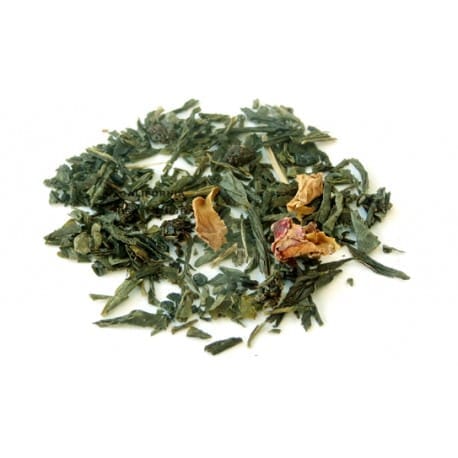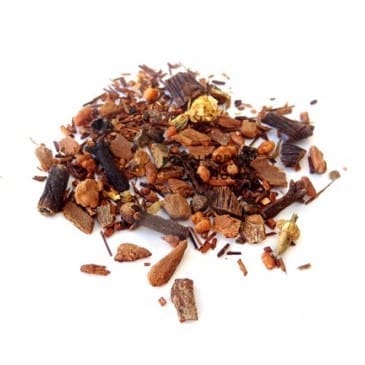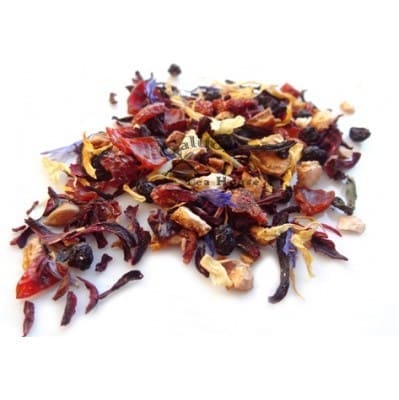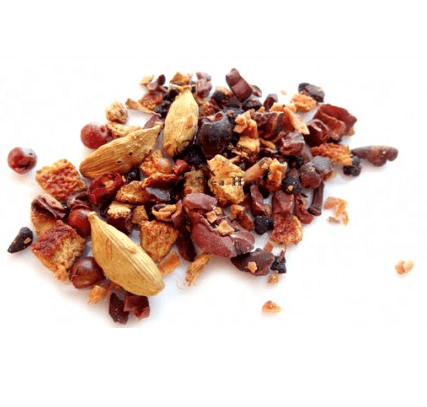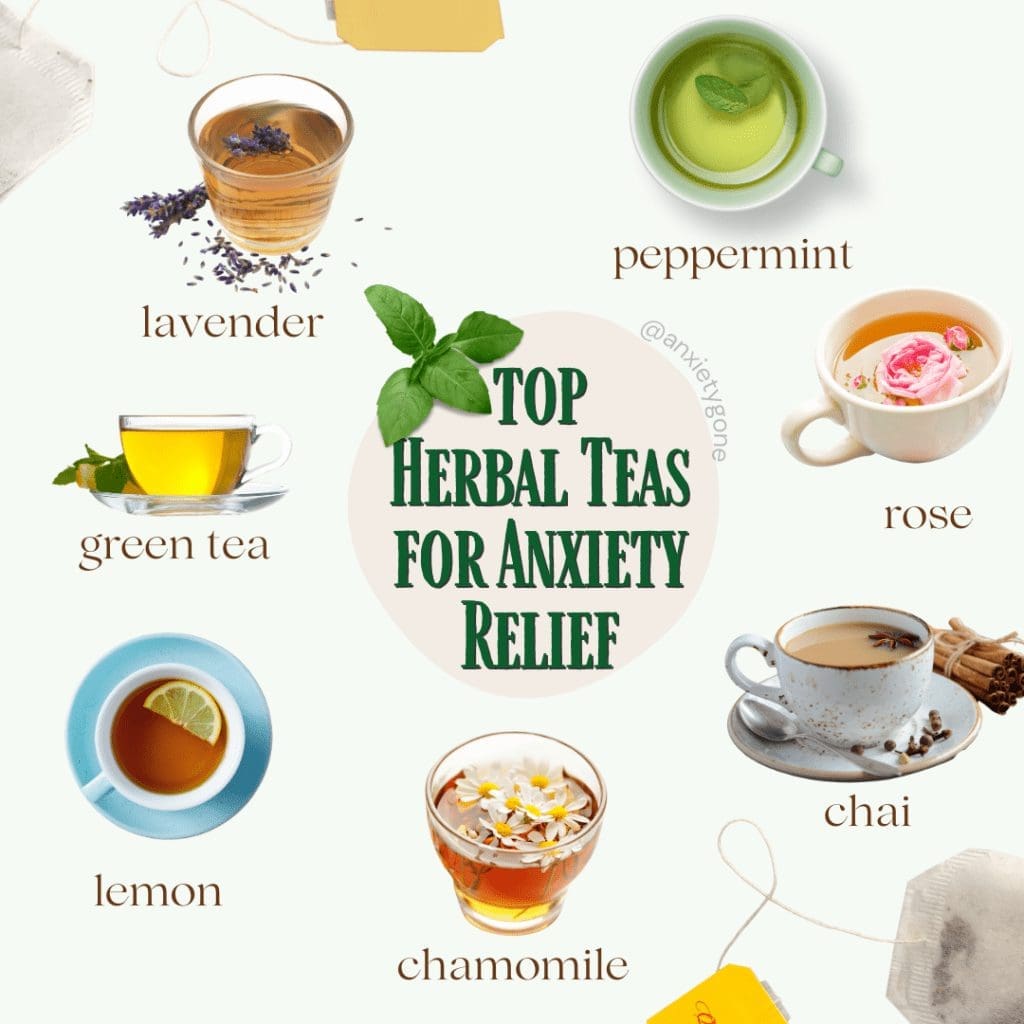Full Disclosure: Clicking on these links could mean a tiny commission for me, at no extra cost to you.
Top Calming Teas for Anxiety and Stress Relief
Whether you’re looking for a natural calming remedy for when anxiety rears its ugly head, a solution for those sleepless, anxious nights or simply want to start your morning off with a steady mind, there’s a calming tea for you! Prep some warm water and pour yourself a cup of tea; it’s time to start sipping on some tea for anxiety relief.
1. Chamomile Tea for Sleep
It’s no surprise that chamomile tea has stood the test of time. Used for centuries in herbal medicine, this gentle floral brew is best known for its ability to calm the nervous system and support restful sleep. Chamomile contains apigenin, a natural antioxidant that binds to receptors in the brain to promote relaxation and ease symptoms of anxiety.
Beyond its well-documented effects on sleep disorders and stress, chamomile also helps relax muscles and reduce physical tension, making it perfect for unwinding after a long, emotionally charged day. It also contains mild sedative properties making it ideal for those who struggle with insomnia, restlessness or simply need to quiet their mind before bed.
- Best for: anxiety relief, sleep disorders, muscle tension, mood support
- How to brew: Use 1–2 teaspoons of dried chamomile flowers per cup of boiling water. Steep for 5–10 minutes, then strain. Add a drizzle of honey or a slice of lemon for a calming, feel-good twist.
2. Lavender Tea for Soothing Anxiousness
Fragrant, floral, and deeply soothing, lavender tea is a natural choice for those seeking emotional balance and stress relief but lavender’s benefits extend to your teacup. Its calming compounds work to reduce anxiety, improve sleep and relax all of that mental tension being stored in your body.
Lavender also helps calm the nervous system by interacting with neurotransmitters in the brain, leading to improved mood and a deeper sense of peace. It’s especially effective when stress manifests as restlessness, irritability or difficulty sleeping as it also contains gentle sedative effects and mood-balancing aroma.
- Best for: anxiety relief, stress reduction, sleep support, emotional balance, relaxation
- How to brew: Steep 1–2 teaspoons of dried lavender buds in freshly boiled water for 5–10 minutes. Strain and enjoy slowly, breathing in the calming scent. Add lemon or honey for a soothing twist and enhanced flavour.
Create a full sensory ritual by sipping your tea while gently spinning your fidget ring or holding a crystal for anxiety, both available in our mental health shop to support your calming routine.
3. Green Tea for Midday Calm
Calming yet clarifying, green tea steeps a beautiful balance between peace and focus. Its winning compound is L-theanine, promotes relaxation without drowsiness, making it an excellent choice for managing stress during the day. When combined with a modest amount of natural caffeine, green tea offers a unique state of calm alertness perfect for navigating work stress, social anxiety or mental fatigue.
Beyond its soothing properties, green tea is loaded with antioxidants, including polyphenols and catechins, which help reduce oxidative stress and support long-term brain and heart health. It’s a smart, steadying option for anyone seeking a natural anxiety remedy that doesn’t sacrifice energy or clarity.
- Best for: stress relief, mental focus, anxiety support, oxidative stress, overall wellness
- How to brew: Use water just below boiling—about 80°C (175°F). Steep 1–2 teaspoons of green tea leaves for 2–3 minutes. Avoid oversteeping to prevent bitterness. Enjoy plain or with a splash of lemon for an antioxidant boost.
Green tea makes an ideal midday ritual. Pair it with a quick grounding practice, like journaling, breathwork, or spinning a fidget ring to refresh both your mood and mindset.
Take a Breath of Anxiety Relief
Inward Breathwork offers expertly guided breathwork sessions to help reduce stress and elevate your emotional well-being. Start your practice today with a 14-day free trial — and feel the difference in every breath.
4. Passionflower Tea for Deep Relaxation
A lesser-known gem in the world of calming teas, passionflower tea is a powerful herbal remedy for both anxiety and sleep issues. Traditionally used in herbal medicine to calm the nervous system, passionflower works by increasing levels of GABA (gamma-aminobutyric acid) in the brain, which is a neurotransmitter that naturally reduces nervous activity and promotes a sense of deep relaxation 2.
Studies have shown that passionflower can be especially effective in reducing symptoms of generalized anxiety and insomnia, as it helps you fall asleep more easily and wake feeling more refreshed. Its calming effects make it ideal for unwinding in the evening or managing heightened anxiety throughout the day.
- Best for: anxiety relief, nervous system support, relaxation, insomnia, improved sleep quality
- How to brew: Steep 1 teaspoon of dried passionflower in freshly boiled water for about 10 minutes. Strain before drinking. For best results, enjoy up to three times daily—especially during high-stress periods or before bedtime.
5. Valerian Root Tea for Sleepiness
When anxiety and sleepless nights go hand in hand, valerian root tea offers a natural way to reset both mind and body. Known for its potent sedative properties, valerian root tea works by boosting levels of GABA, the calming neurotransmitter responsible for slowing down brain activity and easing overstimulation.
As such, it’s often used as a herbal remedy for insomnia and high stress, valerian root tea is ideal for those experiencing chronic anxiety, tension, or difficulty winding down at the end of the day. While its earthy flavour can be intense, its ability to promote deep relaxation is well worth the sip.
- Best for: anxiety, insomnia, stress relief, deep relaxation, nighttime anxiety
- How to brew: Steep 1 teaspoon of dried valerian root in boiling water for 5–10 minutes. Strain before sipping. If the flavour is too strong, blend it with chamomile, peppermint, or lavender for a more pleasant, calming cup.
Valerian root tea is best reserved for your evening routine. Pair it with a warm bath, soft lighting and one of our fidget rings to create a soothing bedtime ritual.
6. Peppermint Tea for Soothing Tension
Crisp, cooling and naturally soothing, peppermint tea is an excellent option for people looking for a tea that calms both the mind and body. Its key compound is menthol, so it’s an incredible natural muscle relaxant, helping ease physical tension and reduce anxiety-related symptoms, such as a nervous stomach.
When stress manifests as tight shoulders, a clenched jaw, or an upset stomach, peppermint can help you release both physical and emotional tension. It’s also a popular choice for supporting digestion and reducing irritability, making it a versatile tea to have on hand throughout the day—or even before bed if anxiety tends to keep you awake.
- Best for: anxiety, muscle tension, mood regulation, relaxation, insomnia
- How to brew: Steep fresh or dried peppermint leaves in boiling water for 5–7 minutes. Strain and sip slowly, allowing the invigorating aroma and cooling sensation to ground your senses.
7. Rose Petal Tea for Calming Emotions
Forget a bed full of roses, or even a bouquet—we want rose tea and all the natural compounds that come with, such as better emotional balance and mental clarity. This tea is rich in antioxidants and anti-inflammatory properties and is particularly helpful during emotionally heavy days, hormonal imbalances, or anytime you feel energetically drained. Its calming scent and soft flavour make it a heart-opening tea that blends beautifully into any self-care or stress-relief routine.
- Best for: anxiety, stress relief, relaxation, emotional wellness, mood support
- How to brew: Steep 1–2 teaspoons of dried rose petals in boiling water for 5–10 minutes. Strain and sip slowly to enjoy both the calming aroma and subtle floral notes. Enjoy it alone or blended with lavender or chamomile for a more layered effect.
Set the mood by pairing your rose tea ritual with a journal session, a few deep breaths, or your favourite anxiety jewelry or crystals for anxiety.
8. Lemon Balm Tea for Easing Anxious Thoughts
Light, citrusy, and beautifully soothing, lemon balm tea has been a go-to herbal remedy for centuries because it contains all sorts of gentle yet effective stress-relieving properties that promote relaxation, ease anxious thoughts, regulate mood and calm the nervous system — without causing drowsiness.
The naturally occurring compounds in lemon balm help r, making it an ideal option for anyone navigating mild to moderate anxiety or overwhelm. Its pleasant lemony flavour makes it one of the most enjoyable anxiety teas to incorporate into a daily routine.
- Best for: anxiety relief, emotional regulation, relaxation, mood support, gentle stress relief
- How to brew: Steep 1–2 teaspoons of dried lemon balm leaves in freshly boiled water for 5–10 minutes. Strain and sip mindfully to savour the subtle citrus flavour and calming effects.
9. Chai Tea for Comfort and Calm
Chai tea is a delicious blend known for its rich, spicy and soul-warming blend of comfort that offers far more than flavour. Chai tea is made with black tea and a soothing medley of spices like cinnamon, cardamom, cloves, and ginger. As you can imagine, it’s deeply grounding and known to support both mental and physical well-being.
Many of the spices in chai tea contain natural compounds that help reduce inflammation, support digestion, and regulate mood. Cinnamon and ginger, in particular, have been linked to lowering cortisol levels and boosting serotonin, making chai a delicious ally in managing anxiety and stress. Its warm aroma alone is enough to begin melting tension away.
- Best for: anxiety relief, stress reduction, mood support, relaxation, digestive wellness, overall health
- How to brew: Simmer 2 cups of water with spices like cinnamon sticks, cardamom pods, cloves, and fresh ginger for 5–10 minutes. Add 2–3 black tea bags and steep for another 3–5 minutes. Mix in 1 cup of milk (or a dairy-free alternative), sweeten to taste with honey or maple syrup, then strain and serve warm—or iced for a summer-friendly twist.
Conclusion
Whether you’re reaching for chamomile to wind down, green tea to stay grounded, or a spicy chai to soothe the soul, every cup is an opportunity to reconnect with your breath, your body and your nervous system. And when paired with tools like our fidget rings, crystals for anxiety and other thoughtfully curated self-care gift sets, your tea ritual becomes more than just a daily habit—it becomes a lifeline. Because healing sometimes starts with a kettle, a mug and five quiet minutes just for you.
FAQs
- What is the best tea for calmness and anxiety relief? The best tea for calmness and anxiety relief varies depending on individual preferences, but popular options include chamomile, lavender, and green tea due to their well-known calming properties.
- How often should I drink tea for anxiety? For optimal results, drink calming tea 1-3 times daily. Adjust based on your personal response and any advice from a healthcare professional.
- Can tea replace medication for anxiety disorders? Drinking tea for calmness can complement but not replace prescribed medication for anxiety disorders. Always consult with a healthcare provider before making changes to your treatment plan.
- Are there any side effects of drinking herbal teas? While generally safe, some herbal teas can cause side effects or interact with medications. Consult a healthcare professional if you have concerns or experience adverse effects.
- How quickly can I expect results from drinking tea? The calming effects of tea can often be felt shortly after consumption, typically within 30 minutes. Long-term benefits are best achieved with regular consumption.
- What is the best way to brew tea for maximum benefits? To maximize benefits, use fresh, high-quality ingredients and follow recommended brewing times and temperatures for each type of tea. This ensures optimal extraction of calming compounds.
Additional Resources
At Anxiety Gone, we believe in healing together. We’ve partnered with trusted wellness organizations to bring you the most effective tools, insights, and support. Some links may earn us a commission — always at no extra cost to you.
Join The Club
Connect with our private self-care community for daily support, exclusive tips, and inspiration. Join us today
Talk Therapy
Get matched with licensed therapists online through BetterHelp and begin your healing today. Start now
Hims/Hers
Receive personalized, affordable mental health care + medication from home — no insurance required. Learn more
Mental Health, Right to your Inbox
Subscribe to our newsletter for a place to rest your mental health and find ways to support your journey. Sign up
Emotional Freedom Technique
Tap your way to calm with scientifically backed stress relief. Our readers receive a 14-day free trial! Try EFT now
Mindfulness App
Access 2,000+ guided practices to support your mental health wherever you are + exclusive discount when you upgrade Try it
Online Breathwork
Experience calm and reset your nervous system with guided sessions and receive your first month free . Get started
Find a Helpline
If you need immediate support, visit our directory to find help near you. See helplines
Calming Teas for Anxiety Infographics
References:
- Camfield, D.A., Stough, C., Farrimond, J., & Scholey, A.B. (2014). Acute effects of tea constituents L-theanine, caffeine, and epigallocatechin gallate on cognitive function and mood: a systematic review and meta-analysis. Nutrition Reviews, 72(8), 507-522. doi:10.1111/nure.12120
- Ngan, A., & Conduit, R. (2011). A double-blind, placebo-controlled investigation of the effects of Passiflora incarnata (passionflower) herbal tea on subjective sleep quality. Phytotherapy Research, 25(8), 1153-1159. doi:10.1002/ptr.3370

